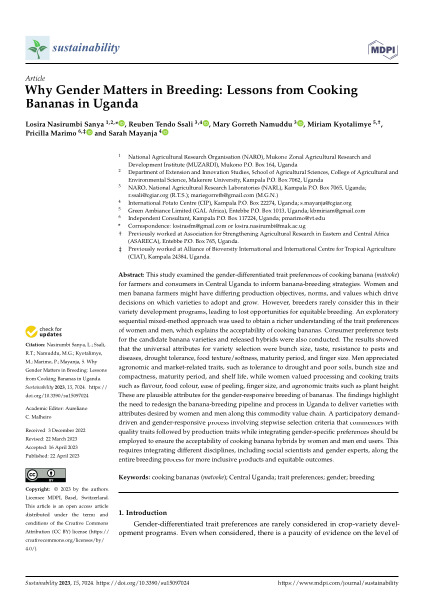This study examined the gender-differentiated trait preferences of cooking banana (matooke) for farmers and consumers in Central Uganda to inform banana-breeding strategies. Women and men banana farmers might have differing production objectives, norms, and values which drive decisions on which varieties to adopt and grow. However, breeders rarely consider this in their variety development programs, leading to lost opportunities for equitable breeding. An exploratory sequential mixed-method approach was used to obtain a richer understanding of the trait preferences of women and men, which explains the acceptability of cooking bananas. Consumer preference tests for the candidate banana varieties and released hybrids were also conducted. The results showed that the universal attributes for variety selection were bunch size, taste, resistance to pests and diseases, drought tolerance, food texture/softness, maturity period, and finger size. Men appreciated agronomic and market-related traits, such as tolerance to drought and poor soils, bunch size and compactness, maturity period, and shelf life, while women valued processing and cooking traits such as flavour, food colour, ease of peeling, finger size, and agronomic traits such as plant height. These are plausible attributes for the gender-responsive breeding of bananas. The findings highlight the need to redesign the banana-breeding pipeline and process in Uganda to deliver varieties with attributes desired by women and men along this commodity value chain. A participatory demand-driven and gender-responsive process involving stepwise selection criteria that commences with quality traits followed by production traits while integrating gender-specific preferences should be employed to ensure the acceptability of cooking banana hybrids by women and men end users. This requires integrating different disciplines, including social scientists and gender experts, along the entire breeding process for more inclusive products and equitable outcomes.
Why Gender Matters in Breeding: Lessons from Cooking Bananas in Uganda
Citation: Sanya, L.N.; Ssali, R.T.; Namuddu, M.G.; Kyotalimye, M.; Marimo, P.; Mayanja, S. 2023. Why Gender Matters in Breeding: Lessons from Cooking Bananas in Uganda. Sustainability, 15(9). ISSN 2071-1050. 20 p.
2023-05-30
ANDEAN ROOTS AND TUBERS, BREEDING, GENDER
Eastern Africa
UGANDA
journal_article

